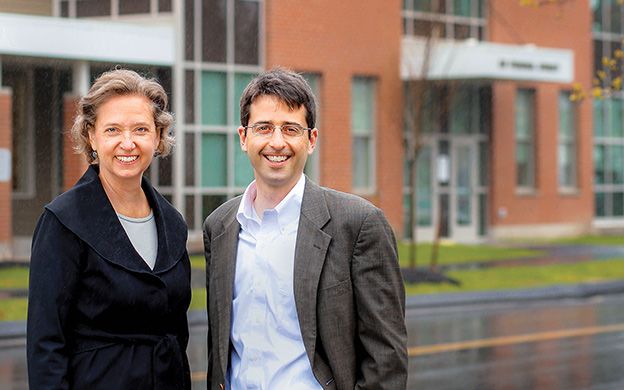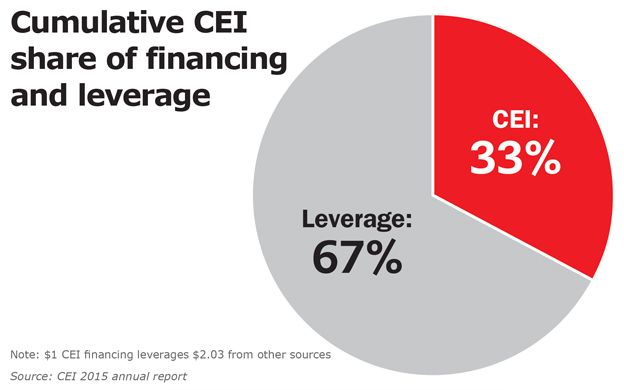Coastal Enterprises Inc. looks to the future in wake of departure
“Retire” is the word that shall not be used in describing what Coastal Enterprises Inc. founder Ron Phillips plans to do after he turns over the leadership reins this week to his successor as CEO, Betsy Biemann, and as president, Keith Bisson.
In fact, when asked if there's a better word to use, uncharacteristically he's momentarily at a loss for words.
“I'm going home,” Phillips says after giving it some thought. “It's been a 24/7 job. It's slowed down a bit in the past year. We did an awful lot of stuff to make this transition be as smooth as possible. We had everything in place for that to happen and while that's been going on, more and more you shift your attention to your home.”
For CEI, Phillips' exit from the community development corporation he founded in 1977 isn't so much the end of an era as it is a thoughtful pause — an opportunity to reflect on CEI's achievements as a CDC over nearly four decades of his leadership, which include providing $1.19 billion in financing to 2,555 businesses, creating or retaining 33,103 full-time jobs, building or preserving 1,882 affordable housing units and creating 5,806 child care slots for working families.
New leadership
The leadership change also comes at a time when the organization is settling into its new headquarters at 30 Federal St. in Brunswick, a $5 million environmentally friendly building designed by CWS Architects and built by Allied Cook. CEI consolidated its offices in Wiscasset and Portland into the Brunswick site. There's a palpable feeling of renewal as you step inside the building, and that's something both Biemann and Bisson say they're ready to take advantage of.
“Obviously, this is a really exciting and important moment for CEI,” says Biemann. “It's an opportunity to step back and celebrate and learn from our past successes — and there are many. It's also a chance to explore the opportunities we have in front of us for the organization's growth and renewal, and to really deepen our impact doing what CEI does best, which is to help more people living in rural communities create better livelihoods for themselves and their families here in Maine, northern New England and rural communities across the country.”
Biemann had served in various capacities on CEI's board of directors — including being vice chairwoman since 2012 — prior to stepping down last year when she became a candidate for Phillips' job. During the last two years, she led the Maine Food Cluster Project of the Mossavar-Rahmani Center for Business and Government at Harvard University, which issued a report last fall that among its recommendations advocates for a food accelerator along the lines of other cluster initiatives such as those in technology.
From 2005-12, she served as president of the Maine Technology Institute. Prior to that she served as an associate director at The Rockefeller Foundation in New York City, where she managed a national grant and investment program dedicated to increasing employment in low-income communities.
Bisson, who's stepping up after being a senior vice president in charge of CEI's small business counseling, natural resources and workforce development programs, brings to his new role as president 12 years of experience in a variety of leadership roles at CEI.
“In many ways my current role has prepared me for this role,” he says. “I'll be responsible for the implementation of all of our programs across the board, the day-to-day implementation as we, under Betsy's leadership, develop a new strategic plan over the next year. I'll be responsible for the implementation of that. Lending will come under me again, and our policy activities. My new role kind of combines all of the core activities of CEI's nonprofit organization.”
“I think the exciting opportunity about having both Keith and I working together as president and CEO is that we bring really complementary experience and networks to our role as leaders of the organization,” adds Biemann. “Obviously with the time I spent at MTI, I bring the lessons we learned there around entrepreneurship development, technology and innovation and how they can be a driver for higher wage jobs, for wealth creation in rural communities.”
Mission-driven investment
Biemann and Bisson have the benefit of an experienced staff of senior and mid-level officers who've worked closely with Phillips over the years in shaping CEI's investment strategies and policy directions. Although both are unequivocal in asserting that CEI is not a “think-tank,” a 2015 report by Senior Vice President Carla Dickstein, who oversees research and policy development at CEI, offers a detailed policy roadmap for both the organization and the state that responds to four broad questions:
- How do we create enough quality jobs to employ our young people, enable them to launch careers, buy homes and raise families?
- How do we meet the needs of the unemployed and underemployed?
- How do we attract talented young individuals and entrepreneurs to guarantee a future for the state?
- How do we integrate immigrants, refugees, asylees and foreign-born into our communities and workforce?
“Maine has serious challenges, but challenges create opportunities for fresh thinking and new strategies,” Dickstein writes.
Among the report's recommendations:
- Establish and support a public institution procurement policy that mandates a minimum percent (e.g., 10% by 2015 and 20% by 2020) of local food purchases and increases state reimbursement for school nutrition programs that buy local food.
- Encourage advanced biofuels research and development and innovation in value-added secondary wood products and wood as a building mater.
- Focus the state's rural tourism efforts on a “sector cluster” in nature-based tourism and prioritize support for existing business development and innovative human capital development programs, like Welcome ME, for front-line tourism workers and business owners.
- Experiment with a targeted strategy to attract talented young people and entrepreneurs and build on existing pockets of in-migration — including “creative professionals drawn to the growing arts and design communities,” new Americans, apprentice farmers and “people seeking authenticity, quality of life and community involvement.”
True to CEI roots
Transforming policy goals into reality takes capital, and that's where CEI has made its mark by offering a continuum of financing tools ranging from tax credits, to venture capital and loans leveraged by a variety of federal and state programs. The recent award of a two-year Seed Fund Support Grant of $250,000 from the U.S. Economic Development Administration has the potential of adding another financing tool: The grant will be used to assess the feasibility of, and demonstrate market demand for, a Natural Resource Business Seed Capital Fund.
“CEI's roots are certainly in the natural resource industries of Maine,” Bisson says, noting that the award will help identify ways of bridging the critical financing gap for new and expanding businesses. “We're still very focused on those sectors. The local food movement is very exciting for the state, whether it's on land or fisheries and aquaculture, sea vegetables and shellfish. I think there's still a lot of opportunities there.”
Both Biemann and Bisson bring to their new roles personal experiences and philosophies that are very much in harmony with their predecessor's vision for CEI that had been guided by one of the Civil Rights era's goals: Creating economic opportunity for people living in poverty.
For Bisson, who grew up in Brunswick, a speech the late Martin Luther King Jr. delivered at Bowdoin College in 1965 epitomizes the kind of “pragmatic realism” underlying CEI's lending and business development programs:
“He was talking about two types of people: There's the extreme optimist and the extreme pessimist. Both of them agree that they should do nothing. For one it's because everything's been solved, and for the other it's because it can't be solved. He was characterizing himself as a pragmatic realist,” Bisson says. “I feel like that's often where we are. There's the world as it is, but we want to make the world a better place through our work. And so, even though you could always name a million things that are worrisome, we're trying to make it better. So that means we're not extreme pessimists, but we're also not blind optimists.”
“My grandparents and my father came to this country to forge a better life,” adds Biemann. “They were fleeing poverty and insecurity in Europe at the beginning of the last century and in the middle of the last century. They were able to live here and with hard work, education and access to capital they were able to make a better life for themselves and their families. So that's one driver for why I've been motivated throughout my career to work on issues of economics and social opportunity.”
Biemann says she'll be spending the next few months listening and learning — from the staff, the board of directors and CEI's partners and funders — as a first step of working with Bisson and the CEI team in “really pioneering the next stage of the organization's life and impact.”
“Ron has been an extraordinary leader of CEI,” she says. ”He's been involved in 39 years of innovation and entrepreneurship. It's quite remarkable what he's achieved. … We will continue to be inspired by Ron's optimism and his determination as we move forward and begin inventing the next future of the organization.”
Read more
Maine startups come out big with $1.3M in MTI funds
Vintage Maine Kitchen in Freeport cooks up old-fashion potato chips
CEI lands $1.75M in federal funding
CEI lands $20M USDA loan to boost community building projects in rural Maine
Rural development boosted with $80M in New Markets Tax Credits to CEI













Comments